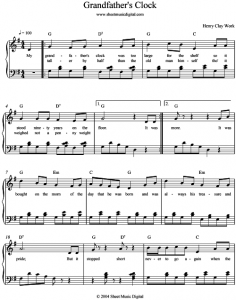Grandfather Clocks Song
Loading...Please Wait...
Posted May 14, 2013Most floor clock shoppers looking for new grandfather clocks do not necessary know that Floor Clocks is essentially synonymous with grandfather clocks, but is also a more recent term for Longcase Clocks and Tall Case clocks, which is how a grandfather clock was referred to pretty much everywhere until the late 1800s.
You may wonder what caused the shift in horology or clock terminology towards the terms grandfather clocks and grandmother clocks. In 1876, a songwriter by the name of Henry Clay Work wrote a song called My Grandfather’s Clock (also known as the clock Grandfather Clock Song) which became incredibly popular and is probably known by much of the adult Western population even to this day. The song is told from the grandson’s perspective, and the words will most likely look familiar, especially if there were a soundtrack playing in the background, which would be a nice aesthetic grandfather clock touch, but not one we are able to do at this time.
Here are the words to Henry Clay Work song, which while sweeping the USA in terms of what people called Free Standing weight-driven pendulum clocks in an enclosed case, it did not change the nomenclature in the United Kingdom or Great Britain, where these clocks are still mostly known to this day as longcase clocks and tall case clocks:
“Grandfather’s Clock” (1876)
Words and Music by Henry Clay Work, No. 52
Dedicated to his Sister Lizzie
1.
My grandfather’s clock was too large for the shelf,
So it stood ninety years on the floor;
It was taller by half than the old man himself,
Though it weighed not a pennyweight more.
It was bought on the morn of the day that he was born,
And was always his treasure and pride;
But it stopped short– never to go again–
When the old man died.
CHORUS
Ninety years without slumbering (tick, tick, tick, tick),
His life seconds numbering (tick, tick, tick, tick),
It stopped short– never to go again–
When the old man died.
2.
In watching its pendulum swing to and fro,
Many hours had he spent while a boy;
And its childhood and manhood the clock seemed to know
And to share both his grief and his joy.
For it struck twenty-four when he entered at the door,
With a blooming and beautiful bride;
But it stopped short– never to go again–
When the old man died.
(CHORUS)
3.
My grandfather said that of those he could hire,
Not a servant so faithful he found;
For it wasted no time, and had but one desire–
At the close of each week to be wound.
And it kept in its place– not a frown on its face,
And the hands never hung by its side;
But it stopped short– never to go again–
When the old man died.
4.
It rang an alarm in the dead of the night–
An alarm that for years had been dumb;
And we knew that his spirit was pluming for flight–
That his hour of departure had come.
Still the clock kept the time, with a soft and muffled chime,
As we silently stood by his side;
But it stopped short– never to go again–
When the old man died.
(CHORUS)
Bio of Henry Work Clay – he was born in Middletown, CT, on 1 October 1832 to the parents of Alanson Work and Amelia A. (Forbes) Work. He married Sarah Parker (b. 15 Oct 1835; d. Jan 1857). She was the fourth child of Daniel and Polly (White) Parker. Henry and Sarah (Parker) Work had four children: Waldo Franklin Work (b. 2 Oct 1857; d. 2 Jul 1871); Willie Lovejoy Work (b. 10 Dec 1861; d. 22 Jul 1862); Ellen (or Nellie) Work (b. 9 Oct 1863; d. 15 Mar 1895); and Clara Etta Work (b. 13 Apr 1868; d. Aug 1868). He had three sisters named Loiusa, Etta and Lizzie. He had at least one brother named Alanson. He apprenticed as a printer in Hartford. He published his first song, We Are Coming, Sister Mary, in 1853. He worked for the periodical Song Messenger of the Northwest (published by Root and Cady). He died, at the age of 51, in Hartford, CT on 8 June 1884. In 1868 he published a book of a serio-comic poem called The Upshot Family.
Among his most popular songs were Brave Boys Are They! (1861), Kingdom Coming! (1862), Grafted into the Army (1862), Little Major (1862), Babylon Is Fallen! (1863), Come Home, Father! (1864), Marching Through Georgia (1865) and we think his most famous, and certainly most relevant, Grandfather’s Clock (1876).
© Clocks Blog and 1-800-4CLOCKS
 and our store in the
and our store in the 

